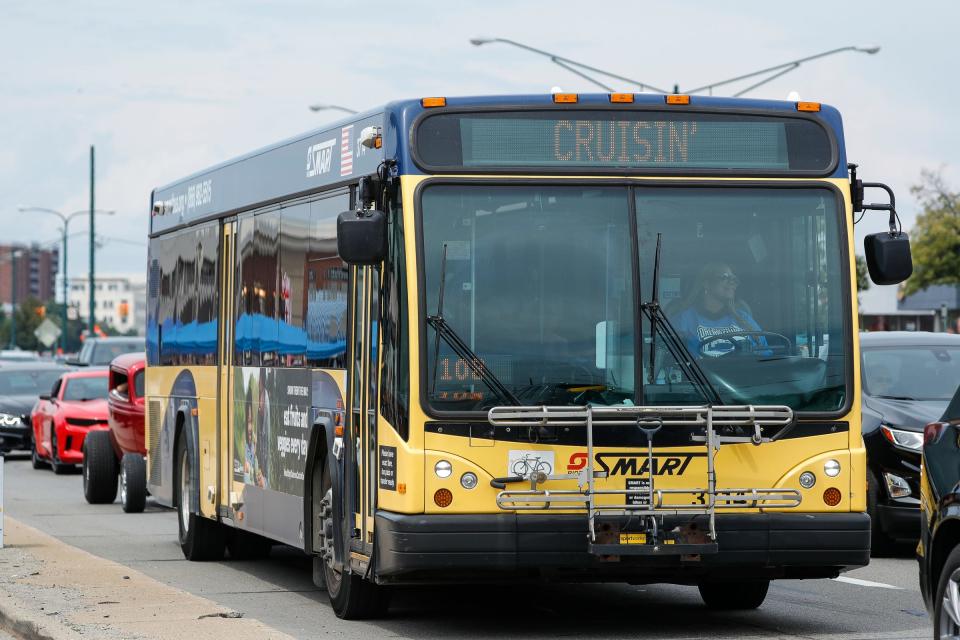Oakland County all in on transit as millage passes; Macomb, Wayne voters also show support
Regional transit efforts got a big boost Tuesday as voters in Oakland County OK'd a countywide transit millage for the first time and votes in support of millages for transit service passed in Wayne County and Macomb County.
The vote in Oakland County — 332,410 in favor to 248,240 against, according to unofficial results, with 97% of precincts reporting as of 9:32 a.m. Wednesday — marks a dramatic shift in the conversation from earlier this year. The Auburn Hills City Council attempted to pull the city out of the Suburban Mobility Authority for Regional Transportation, a move later blocked by a judge.
Instead, metro Detroit, a region that has appeared, at times, hostile to the very concept of transit, is now set for the largest expansion of public transportation in decades.
In Oakland County, that means the system that allowed communities to opt out of SMART is no more. The county with a prominent role in the 2015 story of Detroit “Walking Man” James Robertson’s 21-mile round trip daily bus and walking commute will now be all in on transit, as has been the case in Macomb.
More:Some people think of cheese when they think of southeast Michigan's public transportation
More:Find all 2022 Michigan election results here

That doesn’t mean the entire county is part of SMART. The millage that Oakland County voters approved replaces the SMART millage in communities that have been part of that system with one that will provide funding to SMART and several other transportation agencies. The money also is intended to expand and improve transit options throughout the county.
Oakland County Executive Dave Coulter applauded the millage's approval.
“The task before us now is to work with residents, businesses, organizations, local leaders and transit providers to ensure a seamless system of transportation that meets the needs of all Oakland County residents," Coulter said in a statement Wednesday morning.
Oakland County Commission Chair Dave Woodward, D-Royal Oak, one of the key backers of the measure, cheered its passage Wednesday morning on Twitter.
"Oakland County voters believe in making transit better everywhere and for everyone! After this vote, we finally move the conversation away from who needs or deserves access to transit, to how we make it work better for everyone, especially to help our most vulnerable neighbors," he wrote.
Oakland County hopes millage unlocks federal money
The 10-year, 0.95-mill measure — a slight reduction for those already supporting SMART — is expected to raise an estimated $66 million in its first year. It would direct $38 million toward current service, most of that to SMART, and more than $20 million toward new services and transit routes as well as $7 million toward capital improvements, according to a plan released earlier this year.
The millage would cost the owner of a home with a taxable value of $116,315, which is the average, about $110.50 annually or $9.21 per month, according to the county. The taxable value is typically less than the assessed value.
Advocates say the millage will help the county unlock federal funds for transit services and fill in many of the gaps in what has long been derided as a patchwork system. They argue that better transit will not only improve the lives of those who do not drive, either because they can’t or don’t want to, but it will also boost the area’s economic prospects.
Critics have blasted the effort as a money grab that will burden residents in more rural parts of the county with a new tax for services from which they won’t see enough benefit.
In Macomb and Wayne counties, the transit questions represented more of a status quo approach than what was on the ballot in Oakland, although that was not seen as a guarantee of passage.
More:Metro Detroit voters weigh transit question: Oakland could see big expansion
More:Funding better bus service in Detroit would mean access to thousands of jobs, group says
Support in Macomb County
In Macomb County, where voters barely passed the SMART millage four years ago, yes votes were in the majority Wednesday.
With all 343 precincts reporting, the transit millage passed with 66% of the vote in Macomb County.
Communities supporting the measure included Roseville and Mount Clemens and other communities in the lower and central parts of the county, which have Gratiot as a major SMART bus artery. Macomb, Bruce and Ray townships and other communities in the northern end of the county also supported the millage.
After opposition from some county commissioners nearly prevented a SMART millage question from appearing on the ballot this year, a revised measure, a slightly reduced rate of 0.95 mill for five years, was approved. It's expected to raise $31.1 million in the first year.
In Wayne County’s SMART opt-in communities, the four-year renewal is for just under 1 mill, 0.994. It’s expected to raise $20.2 million in the first year. The vote in favor won handily, 174,897 to 72,724 (71% to 29%), with all 309 precincts reporting, according to the Wayne County clerk's election site Wednesday.
Contact Eric D. Lawrence: elawrence@freepress.com. Follow him on Twitter: @_ericdlawrence. Become a subscriber.
This article originally appeared on Detroit Free Press: Oakland County OKs transit tax, sparking big change

